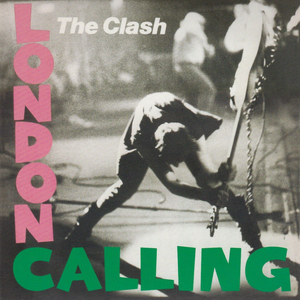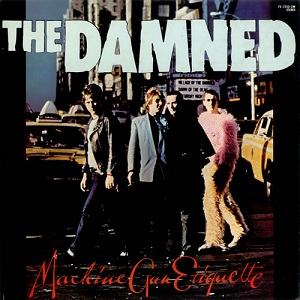
The Clash were an English rock band that formed in London in 1976 and were key players in the original wave of British punk rock. Billed as "The Only Band That Matters", they used elements of reggae, dub, funk, ska, and rockabilly, and they contributed to the post-punk and new wave movements that followed punk. For most of their recording career, the Clash consisted of lead vocalist and rhythm guitarist Joe Strummer, lead guitarist and vocalist Mick Jones, bassist Paul Simonon, and drummer Nicky "Topper" Headon.

London Calling is the third studio album by the English rock band the Clash. It was originally released as a double album in the United Kingdom on 14 December 1979 by CBS Records, and in the United States in January 1980 by Epic Records.

Slaughter and the Dogs are an English punk rock band formed in 1975 in Wythenshawe, Manchester. Their original line-up consisted of singer Wayne Barrett McGrath, rhythm guitar Mick Rossi, drummer Brian "Mad Muffet" Grantham, lead guitarist Mike Day and bassist Howard Bates.

Give 'Em Enough Rope is the second studio album by the English punk rock band the Clash, released on 10 November 1978 through CBS Records. It was their first album released in the United States, preceding the US version of the self-titled studio album. The album was well received by critics and fans, peaking at number two in the United Kingdom Albums Chart, and number 128 in the Billboard 200. The album is tied with Combat Rock (1982) for being the highest-charting album for the Clash in their native United Kingdom.

Sandinista! is the fourth studio album by the English punk rock band the Clash. It was released on 12 December 1980 as a triple album containing 36 tracks, with 6 songs on each side. It crosses various genres including funk, reggae, jazz, gospel, rockabilly, folk, dub, rhythm and blues, calypso, disco, and rap. For the first time, the band's songs were credited to the Clash as a group, rather than to Joe Strummer and Mick Jones. The band agreed to a decrease in album royalties in order to release the 3-LP at a low price.

Combat Rock is the fifth studio album by the English rock band the Clash, released on 14 May 1982 through CBS Records. In the United Kingdom, the album charted at number 2, spending 23 weeks in the UK charts and peaked at number 7 in the United States, spending 61 weeks on the chart. The album was propelled by drummer Topper Headon's "Rock the Casbah" which became a staple on the newly launched MTV. Combat Rock continued the influence of funk and reggae like previous Clash albums, but also featured a more radio-friendly sound which alienated Clash fans. While the recording process went smoothly, the producing process of the album was tiring and full of infighting between Mick Jones and Joe Strummer. Headon's heroin addiction grew worse and he slowly became distant from the band while Strummer and bassist Paul Simonon reinstated Bernie Rhodes as manager, a move unwelcomed by Jones. The band had disagreed on the creative process of the album and called in Glyn Johns to produce the more radio-friendly sound of Combat Rock. Lyrically, Combat Rock focuses on the Vietnam War, postcolonialism, the decline of American society, and authoritarianism.
"I Fought the Law" is a song written by Sonny Curtis of the Crickets and popularized by a cover by the Bobby Fuller Four, becoming a top-ten hit for the band in 1966. Their version of the song was ranked No. 175 on the Rolling Stone list of The 500 Greatest Songs of All Time in 2004, and the same year was named one of the 500 "Songs that Shaped Rock" by the Rock and Roll Hall of Fame.

Nicholas Bowen "Topper" Headon is an English drummer and multi-instrumentalist, best known as the drummer of punk rock band The Clash. Known for his contributions to the drumming world, Headon was inducted in the Rock and Roll Hall of Fame with the rest of The Clash in 2003.

Machine Gun Etiquette is the third studio album by English punk rock band the Damned, released on 2 November 1979 by Chiswick Records.

"Rock the Casbah" is a song by the English punk rock band The Clash, released in 1982 as the second single from their fifth album, Combat Rock. It reached number eight on the Billboard Hot 100 chart in the US and, along with the track "Mustapha Dance", it also reached number eight on the dance chart.

"(White Man) In Hammersmith Palais" is a song by the English punk rock band the Clash. It was originally released as a 7-inch single, with the b-side "The Prisoner", on 16 June 1978 through CBS Records.

The Story of the Clash, Vol. 1 is a double-disc compilation album by the English punk rock band the Clash. Consisting of 28 tracks, it was released on 29 February 1988 by Epic Records. The compilation presents a relatively thorough overview of their career, but does not feature any material from their final studio album, Cut the Crap (1985). An anticipated second volume was to have consisted of live recordings but remains unreleased, although a live compilation, From Here to Eternity: Live, was released in 1999. The original vinyl set was released with four different colored cover variations: red, blue, yellow and green. The compilation was promoted by reissued singles of "I Fought the Law" and "London Calling".

"Complete Control" is a song by The Clash, released as a 7" single and featured on the U.S. release of their debut album.

Michael William Gallagher is an English Hammond organ player best known as a member of Ian Dury and the Blockheads and for his contributions to albums by the Clash. He has also written music for films such as Extremes (1971) and After Midnight (1990), and the Broadway play Serious Money (1987).
Painters and Dockers are a rock band formed in Melbourne, Australia, in 1982.
Kris Needs is a British journalist and author, known for writings on music from the 1970s onwards. He became editor of proto-punk and early punk rock ZigZag magazine in August 1977 at 23 and has since written biographies of musicians and rock stars, including Primal Scream, Joe Strummer and Keith Richards.

"The Call Up" is a song by English punk rock group the Clash. It was released as the first single from the band's fourth album, Sandinista!. The single was released in November 1980, in advance of the release of Sandinista!, with "Stop the World" as its B-side.

Norman Joseph Watt-Roy is an English musician, arranger and composer.

Robert Tench was a British vocalist, guitarist, sideman, songwriter and arranger.
"Garageland" is a song by English punk rock band The Clash featured as the final track for their 1977 debut album The Clash.















